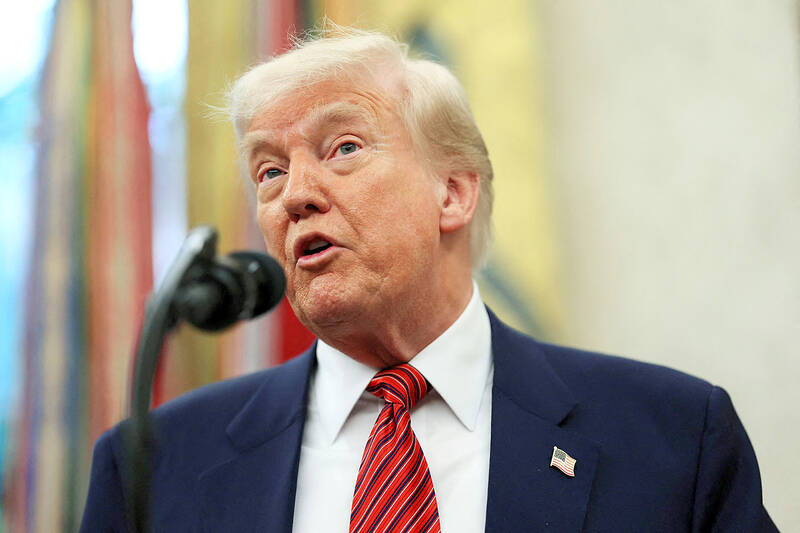A US judge on Wednesday said that any effort by the White House to deport migrants to Libya would clearly violate a prior court order barring officials from swiftly deporting migrants to countries other than their own without first weighing whether they risk persecution or torture if sent there.
US District Judge Brian Murphy issued an order restricting their removal after Reuters, citing three US officials, reported on Tuesday that US President Donald Trump’s administration might for the first time deport migrants to Libya despite previous US condemnation of Libya’s harsh treatment of detainees.
Sending deportees to Libya, a country with a documented history of migrant abuse, would mark a major escalation of the administration’s push for third countries to take in people being removed from the US.

Photo: Reuters
Reuters could not determine how many migrants would be sent to Libya or the nationalities of those the administration was eyeing for deportation, including whether any were Libyan nationals.
The relatives of one Mexican national said he had been instructed to sign a document allowing for his deportation to the African nation.
Immigration rights advocates said in court filings that individuals potentially subject to deportation to Libya also included Filipino, Laotian and Vietnamese migrants.
When asked about the planned deportations, Trump said he did not know whether they were happening.
The Libyan Government of National Unity said it rejected the use of Libyan territory as a destination for deporting migrants without its knowledge or consent.
There was no coordination with the US regarding the transfer of migrants, it added.
Additional reporting by AP

Drug lord Jose Adolfo Macias Villamar, alias “Fito,” was Ecuador’s most-wanted fugitive before his arrest on Wednesday, more than a year after he escaped prison from where he commanded the country’s leading criminal gang. The former taxi driver turned crime boss became the prime target of law enforcement early last year after escaping from a prison in the southwestern port of Guayaquil. Ecuadoran President Daniel Noboa’s government released “wanted” posters with images of his face and offered US$1 million for information leading to his capture. In a country plagued by crime, members of Fito’s gang, Los Choneros, have responded with violence, using car

The team behind the long-awaited Vera Rubin Observatory in Chile yesterday published their first images, revealing breathtaking views of star-forming regions as well as distant galaxies. More than two decades in the making, the giant US-funded telescope sits perched at the summit of Cerro Pachon in central Chile, where dark skies and dry air provide ideal conditions for observing the cosmos. One of the debut images is a composite of 678 exposures taken over just seven hours, capturing the Trifid Nebula and the Lagoon Nebula — both several thousand light-years from Earth — glowing in vivid pinks against orange-red backdrops. The new image

CYBERCRIME, TRAFFICKING: A ‘pattern of state failures’ allowed the billion-dollar industry to flourish, including failures to investigate human rights abuses, it said Human rights group Amnesty International yesterday accused Cambodia’s government of “deliberately ignoring” abuses by cybercrime gangs that have trafficked people from across the world, including children, into slavery at brutal scam compounds. The London-based group said in a report that it had identified 53 scam centers and dozens more suspected sites across the country, including in the Southeast Asian nation’s capital, Phnom Penh. The prison-like compounds were ringed by high fences with razor wire, guarded by armed men and staffed by trafficking victims forced to defraud people across the globe, with those inside subjected to punishments including shocks from electric batons, confinement

Canada and the EU on Monday signed a defense and security pact as the transatlantic partners seek to better confront Russia, with worries over Washington’s reliability under US President Donald Trump. The deal was announced after a summit in Brussels between Canadian Prime Minister Mark Carney and European Commission President Ursula von der Leyen and European Council President Antonio Costa. “While NATO remains the cornerstone of our collective defense, this partnership will allow us to strengthen our preparedness ... to invest more and to invest smarter,” Costa told a news conference. “It opens new opportunities for companies on both sides of the